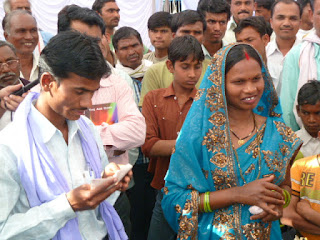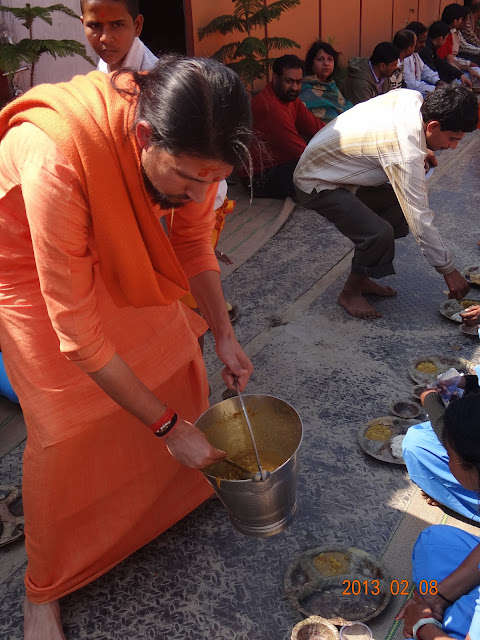Monday, February 11, 2013
Saturday, February 9, 2013
100 New Princesses of Alwar and Tonk take memorable plunge in the 2013 Kumbh Mela
From MASEMBE TAMBWE in New Delhi
For someone who was born a Muslim, went to some schools that
were predominantly Christian and actually enjoyed being part of the choir in
spite my extraordinarily big bass, I have to say I was very intrigued and very
excited to have the opportunity to go and experience that Kumbh Mela in
Allahabad this year.
Kumbh Mela is a mass Hindu pilgrimage of faith in which
Hindus gather at a sacred river for a bath in the river. It is held every third
year at one of the four places by rotation: Haridwar, Allahabad, Nasik and
Ujjain.
Thus the Kumbh Mela is held at each of these four places
every twelfth year. Ardh ("Half") Kumbh Mela is held at only two
places, Haridwar and Allahabad (Prayag), every sixth year.
 |
| Kumbh Mela |
 |
| Kumbh Mela |
The rivers at these four places are: the Ganges (Ganga) at
Haridwar, the confluence (Sangam) of the Ganges and the Yamuna and the mythical
Saraswati at Prayag, the Godawari at Nasik, and the Shipra at Ujjain.
Kumbh means a pitcher and Mela means fair in Hindi. The
pilgrimage is held for about one and a half months at each of these four places
where it is believed in Hinduism that drops of nectar fell from the Kumbh
carried by gods after the sea was churned. The festival is billed as the
"biggest gathering on Earth".
 |
| The crowds at the Kumbh Mela are simply overwhelming |
There is no scientific method of ascertaining the number of
pilgrims even approximately and the estimates of the number of pilgrims bathing
on the most auspicious day may vary very widely from two to eight million
depending upon the team(s) of persons making the estimate and the rough method
of making the estimate.
In 2001, more than 40 million gathered on the busiest of its
55 days. According to the Mela Administration's estimates, around 70 million
people participated in the 45-day Ardh Kumbh Mela at Prayag in 2007.
The last
"Kumbh Mela" held in 2010 in Haridwar was estimated by the
authorities to have attracted between 30 and 70 million people.
 | |||||
| Total devotion to his religion |
 |
| Total devotion to his religion |
The current Maha Kumbh Mela began on 14 January 2013 at
Prayag. According to expectations more than 100 million people will attend the
2013 Kumbha mela. The next Kumbh Mela will be held at Nashik on the bank of the
river Godavari in 2015. The Kumbh at Ujjain is also called
"Simhastha".
Kumbh Mela is organized every three years on a rotation
basis of Prayag, Nashik, Haridwar and Ujjain.
Among the 100 million people expected to attend the 2013,
there were 100 rather special ladies attended it for the first time in their
lives. These 100 ladies are former human scavengers who were liberated by Dr Bindeshwar
Pathak, the founder of the Sulabh Social Sanitation Movement foundation.
 |
| Dreams can come true if you believe |
Before their liberation, the ladies who fall under the
untouchable caste were forced to clear bucket toilets with their hands, they
were not allowed to draw water from wells, had to wear bells on their necks to alert
people passing by that they were coming ad had to clear the way, not allowed to
worship in temples, had to live in the outskirts of towns, not allowed to have
good names or even allowed to spit on the ground.
With the mere invention of a two pit latrine, much of that
changed but to many the icing of the cake of their freedom was being able to
perform their religion’s biggest ritual of having a dip in the River Ganges and
to be accepted by the Hindu upper caste pundits who they dined together with them.
Ms Usha Chandra, the honorary President of Sulabh
International said that she was beyond words when she learnt that Dr Pathak had
arranged for them to attend the Kumbh Mela and that when she entered the water,
it was beyond her wildest dream.
“Dr Pathak and the Sulabh International have totally changed
our lives and we will forever be grateful. Not only have they liberated us, but
they have gone further and brought us to perform this ritual and dine with
priests,” she said with her voice full of emotion.
Ms Chandra said that the process of acceptability among
society has been slow which was expected but said that she was recently caught
off when she was requested to give away a daughter of one of the houses that
she formerly cleaned.
Ms Lalita said that to be liberated, be able to earn a
living, worship in temples and dine with people who once upon a time couldn’t
touch you was a dream come true but to attend and perform prayers with the
priests and also take the dip had uplifted her in a way she had no words to
explain.
Ms Dolly who is currently undergoing her undergraduate
degree said that she was the first person in her clan to perform the Kumbh
Mela.
“I consider myself very lucky to be here. Such rituals are
usually done by the elderly and so for someone of my age to come and perform is
nothing short of a miracle and I consider Dr Pathak a Godsend,” she said.
The presence of the 100 ladies at the Kumbh Mela in
Allahabad caught the attention of people including fellow dippers, throngs of
both local and international media, the police officers, men, women and
children.
If I was ever allowed to describe what it must have felt for
the 100 ladies to walk the 500 meters from their campsite to the Holy River, I
would have to quote a sentence or two from the Shawshank Redemption.
 |
| Its been a long and rough journey, but we did it! |
‘...Andy crawled to freedom through five hundred yards of
shit smelling foulness I can't even imagine, or maybe I just don't want to.
Five hundred yards... that's the length of five football fields, just shy of
half a mile. Andy Dufresne - who crawled through a river of shit and came out
clean on the other side.’ After centuries of discrimination, they managed to
take the dip that washed it all off.
Bride who fled hubby for having no toilet gets slapped with $4,000 award

Good fortune couldn’t have come better to Anita Narre, the Indian now famed bride who ran away from her husband after finding that he didn’t have a toilet, after a local NGO slapped her with 4,000 US Dollars.
Sulabh Sanitation and Social Reform Movement Founder, Dr Bindeshwar Pathak travelled 500kms from Bhopal to present Anita the 4000 US Dollars cheque for what we termed as a ‘courageous yet very peculiar move’.
“This is the first time I have heard of an Indian woman leaving her husband because he didn’t have a toilet in the premises of his house. This move is usually not only an insult to her in laws but also to her parents but because of her cause, we have decided to award her,” he said.
Dr Pathak told journalists yesterday that he first learnt of the story, he was visibly intrigued by it and promised himself that he would give her the recognition she deserves for the bold step she took.
The Local Government Village Executive Officer, Ms Lalita Narre said that when she learnt that Anita had left her husband because of the lack of toilet facilities, she supported her out rightly.
She revealed that thanks to the bold move of Anita, in a space of two weeks, 95 out of 150 households that previously didn’t have toilet have now constructed toilets and the rest are underway.
“I am very proud of her and forever grateful to her because for years we have tried spreading awareness to the women on the importance of having toilets within the home but our efforts have always landed on empty ears,” she said.
Anita Narre explained that it took her only two days after moving in with her husband to reach the decision that unless her husband built a toilet, she would go back to her parents and not return until there was one.
She narrated that on her first day we had to walk 2km away from her house to go and ease herself and vowed that she wouldn’t undergo that torture everyday unless something was done.
“I grew up in an environment that had toilets within the premises of the homestead. I confided with my husband about my concerns and when I saw nothing was being done about it, I took matters into my own hand,” she said.
Her husband, Shevram said that he understood how she felt but at that time he wasn’t in the financial position to construct one but things changed when she left forcing him to seek assistance from the local government office and in eight days, one was constructed and the wife returned.
Ms Anita said that it was beyond her wildest dreams that her story would arouse so much media attention and she will be forever thankful to the Sulabh International Social Service Organisation for the token that they had awarded her.
“With this boost, I will now be able to construct a bathroom where my family and I can comfortably bathe from as well as give our house a facelift,” she said.
She said that it was her dream that a time would come where all women in India and other parts of the world have access to clean and hygienic toilet facilities and no longer have to walk long distances and at awkward hours to simply answer a call of nature.
A social worker stationed in Bhopal and a Sulabh employee, Ms Swati Khemaria said that Anita broke one of India’s biggest taboos, leaving your husband’s home and returning to your own unescorted and for something as mere as a toilet.
Ms Swati explained that in Indian tradition, once a woman is married, she belongs to her in laws and isn’t supposed to return to her parents irrespective to the conditions that she is facing at her in laws.
Open defecating is still one of the biggest challenges to sanitation in India and in many other parts of the world. It is estimated by the World Health Organisation that approximately 2.6 billion do not have toilet facilities in the world.
Subscribe to:
Posts (Atom)









































